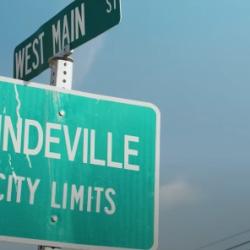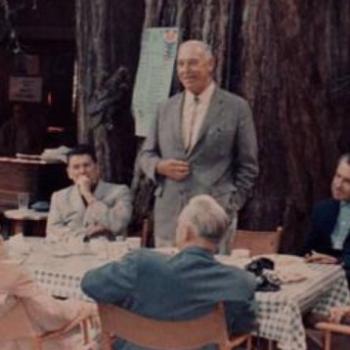I wound up having a lot of fun at the Slacktivixen’s 25th high school reunion. It was kind of like going to a wedding reception without the wedding beforehand — a big, friendly party where everyone just happened to be one year younger than me and a lapsed Catholic. Good times.
I think 25th reunions are more relaxed than 10th or 15th reunions, where some folks are still competing and comparing. By your 25th, everybody can admit they’re on Plan B or Plan C in life and no one seems to have the desire or energy to pretend otherwise. (Church, I think, should be more like a 25th reunion in that regard.)
I haven’t been back to Jersey for any class reunions or homecomings in a long time, but hearing all those stories of the ‘vixen’s high school years got me thinking again of my alma mater, Timothy Christian School.
 TCS, which I attended from third grade all the way through high school, is a fundamentalist private school. It’s not “evangelical,” but full-on fundie. I’m talking a literal reading of an inerrant, infallible King James Version Bible, with young-earth creationism taught in science classes and Hal Lindsey and Josh McDowell books used as textbooks in Bible class. It was about as effing undie as fundie can be.
TCS, which I attended from third grade all the way through high school, is a fundamentalist private school. It’s not “evangelical,” but full-on fundie. I’m talking a literal reading of an inerrant, infallible King James Version Bible, with young-earth creationism taught in science classes and Hal Lindsey and Josh McDowell books used as textbooks in Bible class. It was about as effing undie as fundie can be.
And that meant I was taught the very same house-of-cards construct of faith that I’ve often criticized here.
Fundamentalist Christianity is a package deal — an inseparable, all-or-nothing bundle of teachings and ideology that says every piece depends on every other piece. If any one piece of it isn’t true, fundamentalism insists, then it all falls apart and none of it is true.
That’s a cruel construct that sets you up for a miserable future. It guarantees an eventual crisis of faith that can lead either to a lifetime of white-knuckled denial and desperate pretense or to the abandonment of the whole enchilada.
Viewed from the outside, this all-or-nothing claim doesn’t make much sense. From the outside, the separate components of fundamentalism’s package deal do appear separate and separable. From the outside, it just seems kind of silly to insist that, for example, belief in the Golden Rule requires and is somehow dependent on belief that the universe is only 6,000 years old.
But from the inside, within fundamentalism, this all-or-nothing message is pounded home again and again with such frequency and urgency that it seems true to those shaped by that world. Belief in Jesus, in forgiveness, or in faith, hope and love, really does come to seem contingent and dependent upon all those other beliefs in inerrancy, literalism, creationism, and whichever weird American variant of eschatology your particular sub-group of fundies subscribes to.
And that means, for those shaped by fundamentalism, that belief in Jesus, faith, hope and love are all constantly imperiled by even fleeting glimpses of reality. Some such glimpse will eventually penetrate the protective fundie shell — the recognition that maybe all sedimentary rocks didn’t come from Noah’s flood, the realization that the Synoptic Gospels can’t be easily “harmonized,” the attempt to evangelize some Hellbound Episcopalian that results in them getting the better of the conversation. And when that happens, the whole edifice threatens to topple like some late-in-the-game Jenga tower.
At that point, the reality-punctured fundie is trained to believe they have only two choices. Either they can fiercely decide to pretend it never happened and that they never caught such a glimpse — thus becoming the sort of person who is increasingly capable of such pretense and denial. Or they can chuck it all and embrace the nihilism and meaninglessness that they were always taught was the only alternative to this fragile fundie faith.
We were taught that at TCS too. Such all-or-nothing fundamentalism was what we were constantly told was true.
But we were also shown something healthier.
This was, I think, an accident — an unintended fluke of providence or luck. But for me and for others who were shaped by Timothy Christian, it was a saving grace. It was something that equipped us and enabled us to escape the all-or-nothing lie at the center of the house-of-cards fundie faith.
In part 2, I’ll discuss what this saving grace was, and why it mattered for me even if, at the time, I barely noticed it.















